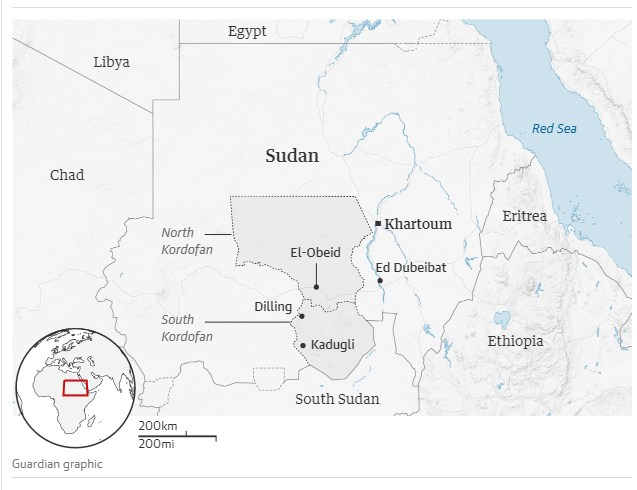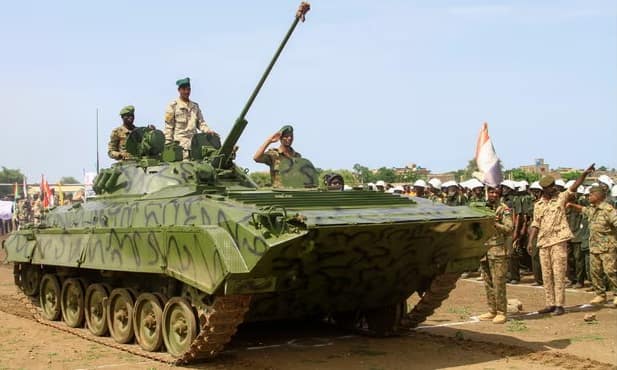Families said to have run away with nothing as three forces fight in South Kordofan state
Zeinab Mohammed Salih in Khartoum
Thousands of people have fled their homes in the capital of South Kordofan state in Sudan after an attack by the Sudan People’s Liberation Movement-North rebel group, one of three forces now fighting in the area.
The SPLMN has been trying to capture the city from the regular army, known as the Sudanese Armed Forces, since June, when it entered the conflict that broke out in April between the SAF, led by Gen Abdel Fattah al-Burhan, and the paramilitary Rapid Support Forces (RSF), led by Mohamed Hamdan Dagalo.
“The situation is really bad,” a resident of the state capital, Kadugli, said. “Families ran away with nothing, no food, no money. Even the international NGOs could not feed them.”
The resident said civilians were seeking shelter at schools and mosques in Kadugli’s eastern neighbourhoods. Some had only recently arrived in Kadugli having previously fled Khartoum, the country’s capital and the scene of months of heavy fighting.
A number of armies and militias are active in Sudan’s restive southern and western regions, and the advance by the SPLMN will raise fears that the country is sliding into a full-scale civil war.
The SPLMN has taken about 10 bases from the SAF around Kadugli and the town of Dilling since June, meeting very little resistance, according to people living in the state. In the process it has expanded its territorial control of the state from about half to 60%.
In a sign of the chaotic three-way nature of the conflict in the state, the RSF has taken control of the strategic town of Ed Dubeibat, which links South Kordofan to the rest of Sudan with a network of roads and railway.
The SAF has blocked the roads linking Kadugli and Dilling in an attempt to prevent people fleeing the SPLMN advance. However, hundreds of families managed to get out of Kadugli in June and July, many of whom headed for El-Obeid, the capital city of neighbouring North Kordofan state.
El-Obeid is itself a hotspot of fighting between the SAF and the RSF, but Ali al-Shargawi, a teacher at a primary school in Kadugli, said many people still considered it a safer bet. “Kadugli might be plunged into a civil war very quickly,” Shargawi said. “We have a history of that, and all elements are here now.”
The 36-year-old lost his job as a teacher when the war began, and started working in a market. However, like countless people across the country he has not received a salary in months.
“I don’t want to leave, I am tired of running away,” Shargawi said, detailing how he had twice had to leave his family home in a village in South Kordofan due to fighting since 2011.
Azaheer Dahia, an engineer and women’s rights volunteer at various NGOs, said lots of people had died in SPLMN attacks on villages around Kadugli. “Some people had just come down from Khartoum and found themselves running away again,” she said.
“The situation is getting worse, especially after the army’s decision to close the road connecting Khartoum to Kordofan and Darfur.”
Dahia said every vehicle on the road was considered to be a military target, so goods were not entering areas that needed them desperately. As a result, people were paying much greater sums than usual for goods smuggled from South Sudan.
The SPLMN was founded by organisations within the predominantly South Sudanese Sudan People’s Liberation Movement that remained in Sudan following the South Sudanese vote for independence in 2011. A continuing low-level conflict between the SPLMN and the SAF has been reignited by the outbreak in hostilities between the SAF and the RSF.

Troops from another rebel group, the Darfur-based Sudan Liberation Army, who have been fighting as mercenaries in Libya, have returned to Darfur in western Sudan in recent weeks, according to sources. The troops had made a number of failed attempts to cross the Libyan border, which is controlled by the RSF. Sources indicated that the leadership of the the SPLMN and the Sudan Liberation Army have been meeting in the Ethiopian capital, Addis Ababa, for unofficial talks with the RSF.
Battles resumed on Thursday in the North Darfur state capital of El Fasher, disrupting nearly two months of calm in the densely populated city that has become a shelter from the shelling, looting, rapes and killings reported in other parts of Darfur.
The movement of rebel groups in the west and south of Sudan was to be expected, given the “weakness” of the SAF, Shamael el-Noor, a Khartoum-based political analyst, said.
“For the SPLMN, it’s a good chance for them to take control of new areas,” Noor said. “I don’t think the SPLMN is siding with either of the two sides fighting in Khartoum, but they might be aiming at upcoming negotiations when every side will present what they have on the negotiation table.”
The conflict has killed at least 3,900 people nationwide, according to a conservative estimate by the Armed Conflict Location & Event Data Project. The actual toll is believed to be much higher, as the fighting restricts access to many areas.
